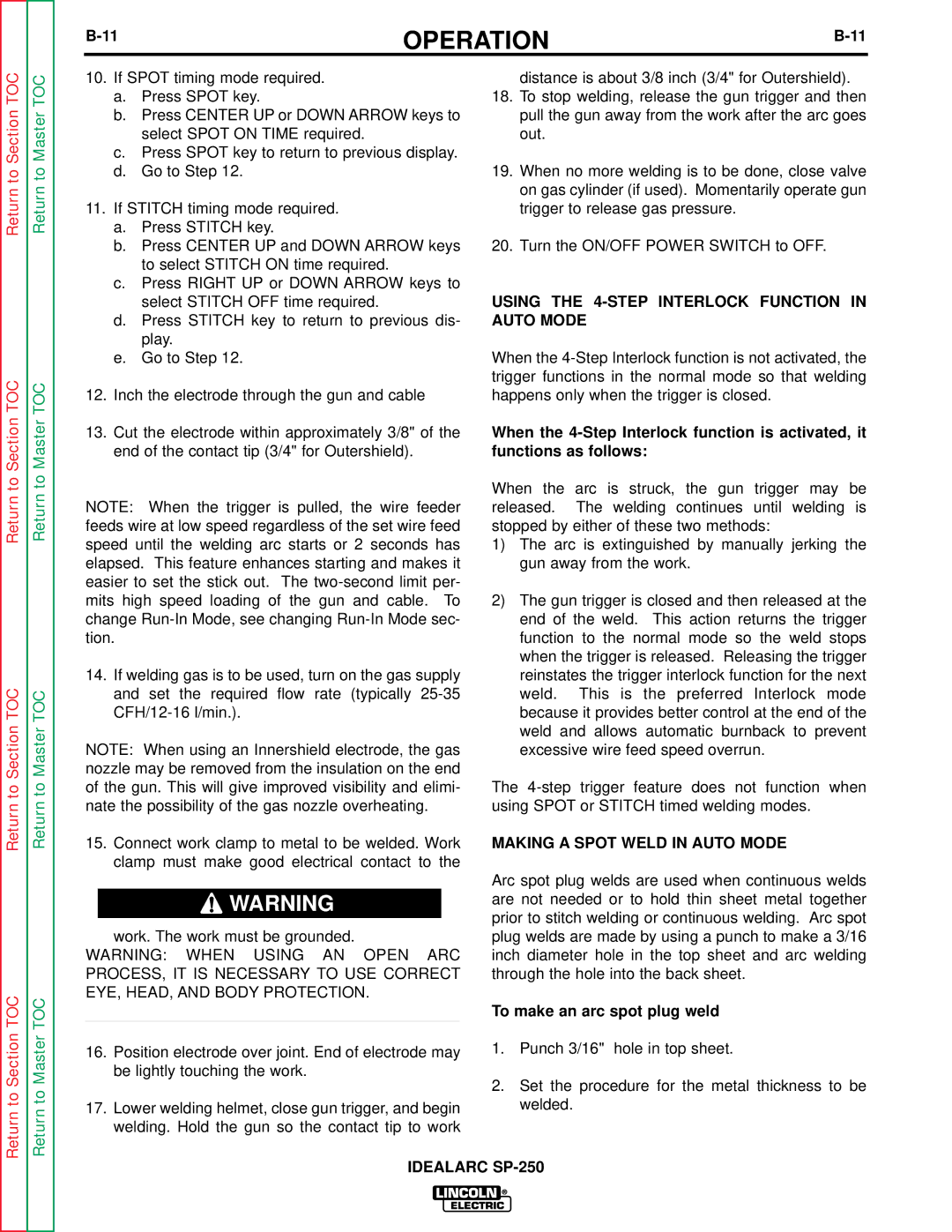
OPERATION | ||
|
|
Return to Master TOC
Return to Master TOC
Return to Master TOC
Return to Master TOC
10.If SPOT timing mode required.
a.Press SPOT key.
b.Press CENTER UP or DOWN ARROW keys to select SPOT ON TIME required.
c.Press SPOT key to return to previous display.
d.Go to Step 12.
11.If STITCH timing mode required.
a.Press STITCH key.
b.Press CENTER UP and DOWN ARROW keys to select STITCH ON time required.
c.Press RIGHT UP or DOWN ARROW keys to select STITCH OFF time required.
d.Press STITCH key to return to previous dis- play.
e.Go to Step 12.
12.Inch the electrode through the gun and cable
13.Cut the electrode within approximately 3/8" of the end of the contact tip (3/4" for Outershield).
NOTE: When the trigger is pulled, the wire feeder feeds wire at low speed regardless of the set wire feed speed until the welding arc starts or 2 seconds has elapsed. This feature enhances starting and makes it easier to set the stick out. The
14.If welding gas is to be used, turn on the gas supply and set the required flow rate (typically
NOTE: When using an Innershield electrode, the gas nozzle may be removed from the insulation on the end of the gun. This will give improved visibility and elimi- nate the possibility of the gas nozzle overheating.
15.Connect work clamp to metal to be welded. Work clamp must make good electrical contact to the
![]() WARNING
WARNING
work. The work must be grounded.
WARNING: WHEN USING AN OPEN ARC PROCESS, IT IS NECESSARY TO USE CORRECT EYE, HEAD, AND BODY PROTECTION.
____________________________________
16.Position electrode over joint. End of electrode may be lightly touching the work.
17.Lower welding helmet, close gun trigger, and begin welding. Hold the gun so the contact tip to work
distance is about 3/8 inch (3/4" for Outershield).
18.To stop welding, release the gun trigger and then pull the gun away from the work after the arc goes out.
19.When no more welding is to be done, close valve on gas cylinder (if used). Momentarily operate gun trigger to release gas pressure.
20.Turn the ON/OFF POWER SWITCH to OFF.
USING THE 4-STEP INTERLOCK FUNCTION IN AUTO MODE
When the
When the
When the arc is struck, the gun trigger may be released. The welding continues until welding is stopped by either of these two methods:
1)The arc is extinguished by manually jerking the gun away from the work.
2)The gun trigger is closed and then released at the end of the weld. This action returns the trigger function to the normal mode so the weld stops when the trigger is released. Releasing the trigger reinstates the trigger interlock function for the next weld. This is the preferred Interlock mode because it provides better control at the end of the weld and allows automatic burnback to prevent excessive wire feed speed overrun.
The
MAKING A SPOT WELD IN AUTO MODE
Arc spot plug welds are used when continuous welds are not needed or to hold thin sheet metal together prior to stitch welding or continuous welding. Arc spot plug welds are made by using a punch to make a 3/16 inch diameter hole in the top sheet and arc welding through the hole into the back sheet.
To make an arc spot plug weld
1.Punch 3/16" hole in top sheet.
2.Set the procedure for the metal thickness to be welded.
